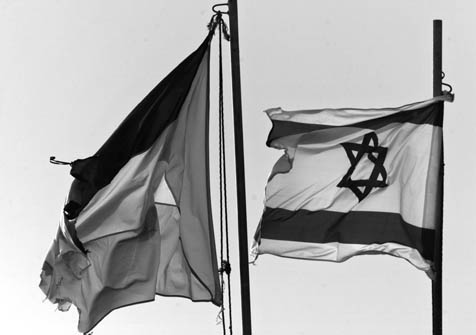 It has not been a week of progress for Palestinian officials. The reconciliation talks between Fatah and Hamas have failed to show any signs of reconciling, and Yasser Abed Rabbo, Secretary-General of Palestine Liberation Organization (PLO), told reporters Sunday that he and his colleagues were in the dark on other important matters:
It has not been a week of progress for Palestinian officials. The reconciliation talks between Fatah and Hamas have failed to show any signs of reconciling, and Yasser Abed Rabbo, Secretary-General of Palestine Liberation Organization (PLO), told reporters Sunday that he and his colleagues were in the dark on other important matters:
The Palestinian side is unaware of the details of the talks between the Israeli side and the Americans concerning finding a middle-ground form over freezing settlements. Once we receive an official American response, the Palestinian leadership would study it.
Beyond this feigned surprise, it is obvious that Ramallah is not confident with the proposal to West Jerusalem. The PLO Executive Committee issued a statement saying that “a settlement freeze must be comprehensive and permanent". One official closely associated with the Palestinian Authority leader Mahmoud Abbas told The Jerusalem Post that the PA’s credibility would be severely damaged if it resumed the peace talks with Israel while “the building was continuing in East Jerusalem”. The chief PLO negotiator Saeb Erekat, said that the PA would consult with “Palestinian and Arab leaderships” before announcing its final stance regarding the US proposal.
Another Palestinian leader, Salam Fayyad, told the London-based newspaper Asharq al-Awsat that U.S. commitments to Israel in exchange for the freeze, especially commitments related to security issues, are more dangerous than the actual construction in the settlements.
Washington's response took no apparent notice of these qualms. Returning from his Asia trip, President Obama, referring to reports that Netanyahu would probably win narrow approval from his coalition for the U.S. package of incentives, said: "I commend Prime Minister Netanyahu for taking, I think, a very constructive step. It's not easy for him to do but I think it's a signal that he is serious."
And the Israelis? On the weekly cabinet meeting, Netanyahu stated that the draft was still in progress:
At this morning's meeting, I intend to update my fellow ministers on the general outline of the American proposal for the resumption of the peace talks. This proposal was raised during my talks with Secy. of State Clinton. It is still not final; it is still being formulated by Israeli and the American teams. If and when it is complete, I will bring this proposal to the appropriate Government forum, which in this case is the Cabinet. In any case, I insist that any proposal meet the State of Israel's security needs, both in the immediate term and vis-à-vis the threats that we will face in the coming decade.
According to sources, in the 15-minister Diplomatic-Security Cabinet, Netanyahu will get a narrow 7-6 victory with 2 Shas ministers abstaining.
From Labour, Defense Minister Ehud Barak and Industry, Trade and Commerce Minister Binyamin Ben-Eliezer will vote in favour. Among the Likud ministers in the cabinet, Finance Minister Yuval Steinitz, Education Minister Gidon Saár, and Intelligence Services Minister Dan Meridor are all expected to vote with the Prime Minister. However, Netanyahu lost his two vice premiers, Moshe Ya'alon and Silvan Shalom. Ya'alon said, "Extending the freeze is a honey trap which will lead us down a slippery slope and into another crisis with the American administration after three months, or perhaps even sooner," while Shalom warned of "a strategic mistake". Minister-without-Portfolio Bennie Begin will also oppose the US package.
Israel Beiteinu's three ministers in the cabinet --- Foreign Minister Avigdor Lieberman, Internal Security Minister Yitzhak Aharonovich, and National Infrastructures Minister Uzi Landau --- will also all cast votes against the freeze. However, Justice Minister Yaákov Neéman, who is an independent affiliated with Yisrael Beiteinu, is projected to decide matters by backing Netanyahu.
Netanyahu assured his ministers, "In any case, we will talk about all the issues [with the PA], not just about borders." The Prime Minister's aides said later that he has no intention of complying with the U.S. demand to discuss borders first, noting that he told Clinton last week "all the issues must be on the table". He also told Clinton that Jerusalem should be the last item on the agenda, due to its sensitivity.
Intelligence and Atomic Energy Minister Dan Meridor later elaborated that Israel should seek to obtain a final border that roughly follows the route of the separation fence and leaves the large settlement blocs as part of Israel.
As soon as there is white smoke from West Jerusalem on its proposal, the Obama Administration will despatch its special envoy George Mitchell to urge the Palestinians to sit on the table. By that time, Ramallah may have gone to the Arab League for another "yellow" light on talks, one which may become green one if the issue of the borders is addressed during the three-month extension of Israel's settlement freeze. Alternatively, the light may be red if there is no movement on the status of East Jerusalem or swaps of territory.